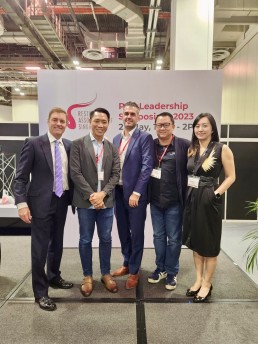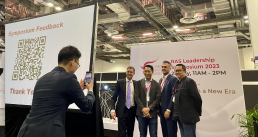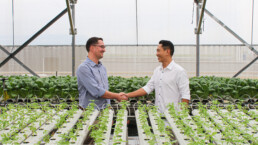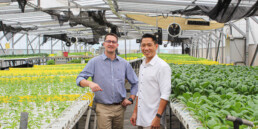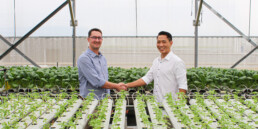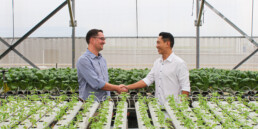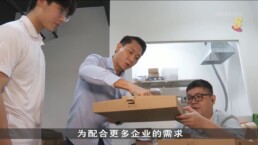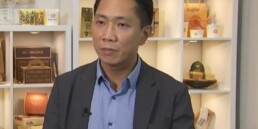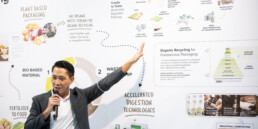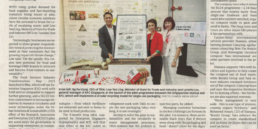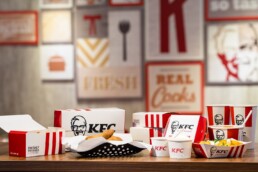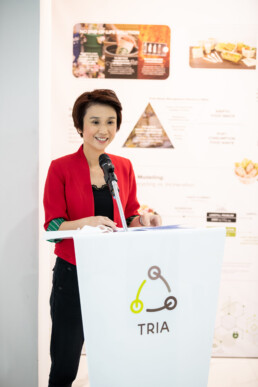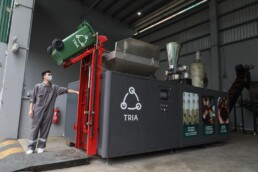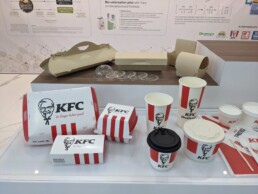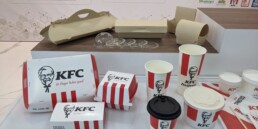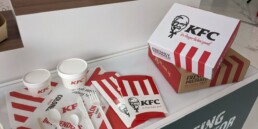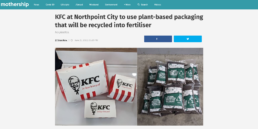Panel Discussion at RAS Leadership Symposium 2023

On 25 May, our CEO Ng Pei Kang attended the 2023 Leadership Symposium held by Restaurant Asia Singapore! Pei Kang was invited as one of 4 distinguished speakers for the panel on Building a Sustainable Future: The Role of F&B Businesses. We had a constructive discussion on how F&B businesses can navigate the emerging realm of sustainability agendas. It was a pleasure to share our perspective on their transition into sustainability, through the lens of packaging redesign and circularity.
TRIA partners with Yara International
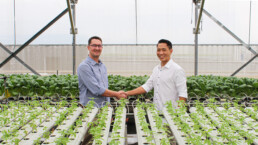
TRIA partners with Yara International to develop circular fertilisers from urban foodservice waste
SINGAPORE. Local enterprise TRIA, a forefront provider of circular foodservice packaging solutions, explores a long-term partnership with Norwegian based Yara International, the world’s leading crop nutrition company and a provider of environmental and agricultural solutions.
- TRIA and Yara International announce a partnership to develop circular fertiliser solutions from urban foodservice waste. This involves the extraction of valuable nutrients in foodservice waste from the food retail and hospitality sectors. Such nutrients can be developed into commercial-grade fertiliser to nourish food crops, instead of being sent as waste to incineration or landfill facilities.
- The ambition of the partnership between TRIA and Yara International is to provide a scalable, commercially viable closed-loop offering to global foodservice companies, allowing them to (1) recycle their foodservice waste and related nutrients, including single-use packaging, making sure food never creates waste, (2) regenerate soil health to cultivate more nutritious food, ensuring there is plenty to feed the future, (3) reduce the end-to-end carbon footprint from farm-to-food-to-waste by avoiding incineration, paving the way for a low-carbon food ecosystem. This system-wide circular approach can be one that truly exemplify the future of sustainable consumption.
- TRIA’s closed-loop solution for packaging has been making waves with the world’s first pilot with fast food giant KFC Singapore. TRIA continued the momentum with yet another pilot at the Formula 1 Singapore Airlines Singapore Grand Prix (Singapore GP) last September. Single-use foodwares and food waste from the event were turned into farm-ready fertilisers for food crops. This effectively allowed Singapore GP to close the loop on waste.
Foodservice waste from the hospitality and food retail sectors is a sizeable problem for the environment. Globally foodservice waste amounts to an estimate of 240 million tonnes of food waste1 and 140 million tonnes of plastic packaging waste2 each year. The recycling of these foodservice waste is proving to be difficult, requiring resource intensive and tedious source segregation – the reason why it usually ends up at the incineration or landfill at significant financial and environmental cost.
With TRIA’s patented Rapid Depolymerisation (RD) technologies, foodservice waste packaging (made with TRIA’s proprietary NEUTRIA® material) and food waste itself can be recycled together as a single organic waste stream, without the need for source segregation. This effectively allows the organic recycling of mixed foodservice waste, which would otherwise be too difficult to be handled by conventional recycling methods.
TRIA and Yara have embarked on a Proof-of-Concept (PoC), with the objective of deriving a range of commercial-grade circular fertilisers from various foodservice waste feedstocks through organic recycling.1 UN Environment Programme. (2021). UNEP Food Waste Index Report 2021, (pp. 70) 2 Geyer, R., Jambeck, J. R., & Law, K. L. (2017). Production, use, and fate of all plastics ever made. Science advances, 3(7), e1700782.
The PoC will assess the viability of each waste feedstock and deploy proprietary techniques in depolymerisation, digestion, and hygienisation to harvest nutrients, organic matter, and carbon. Appropriate nutrient formulations will be further developed to attain bioequivalence on par with industry standards. The goal is to realise a stable nutrient pool that results in sustainable, healthy, productive soil, while maximizing crop health and yields in commercial agriculture at scale.
“Yara is extremely pleased to announce this partnership with TRIA in Singapore. The current geopolitical crisis has resulted in global fertiliser shortages, which is directly creating widespread food insecurity. Even without the current situation, food security has always been vulnerable, because everything we produce ultimately depends on the health of our soil. If our soil is not healthy, our ability to grow nutritious crops in a sustainable manner will be compromised.”
“Our partnership with TRIA will help Singapore manage its organic waste, while transforming it into commercially-viable fertilisers. These crop nutrition solutions will enable smallholder and commercial farmers to improve soil health sustainably. This is a vital part of ensuring that initiatives like Singapore’s 30% domestic food production by 2030 can be achieved.”
“We welcome and invite Singaporean and global food value chain businesses to join us, and to explore possible areas for collaboration on this important project.”
– Werner Prinsloo, Director – Sustainability & Food Chain, Yara Africa & Asia
A regenerative agriculture approach builds and revitalizes soil health by introducing organic matter to support better agricultural systems. This approach provides multiple benefits to soil health, such as improve soil’s water holding capacity, its organic carbon content and improves the nutrient density for crops. This is a dynamic and holistic approach, including conservation tillage, cover crops, crop rotation, composting, mobile animal shelters and pasture cropping, to increase food production, farmers’ income and especially, topsoil. It contributes to healthy soil which is capable of producing high quality, nutrient-dense food, while simultaneously improving – rather than degrading – lands. This ultimately leads to productive farms and healthy communities and economies.
The partnership between TRIA and Yara signifies a milestone for the circular food ecosystem, where industry partners across the food value chain co-develop and co-create new value, and to take ownership to help close the loop.
“TRIA crossed a couple of key milestones recently, they included our pilot with KFC Singapore as a world’s first and also empowering Formula 1 Singapore Airlines Singapore Grand Prix to close the loop with their foodware and food waste.”
“Continuing our momentum to form collation partners along the value chain, I’m very excited to have this joint announcement between TRIA and Yara International on a partnership that allows us to create new value from foodservice waste which will otherwise be disposed of.”
“From unwanted waste to world-class fertilisers, resulting in nutritious vegetables back on our tables, this is the new circular economy for food!”
– Ng Pei Kang, Chief Executive Officer, TRIA
Notes to editors:
TRIA should be represented in all CAPS whenever printed and all accompanying imagery to be attributed to TRIA. Do keep us in the loop on published articles.
About TRIA
TRIA is an award winning close-the-loop company for packaging, offering a range of sustainable packaging solutions from product, services to end-to-end ecosystem.
TRIA is at a crucial juncture of scaling up her closed-loop solution to address the non-recyclability of single-use food packaging. With her patented technologies based on organic recycling, both packaging (made with TRIA’s proprietary NEUTRIA® material) and food waste can be recycled together as a single organic waste stream without source segregation. This enables foodservice brands like KFC to recycle their packaging and food waste.
TRIA’s solution has been showcased in over 176 global media channels including Packaging Insights, Plasticity Thailand, Asian Development Bank, Eco-business, Tech in Asia and Channel News Asia. TRIA was also mentioned in the 2019 Singapore Budget by Singapore’s Deputy Prime Minister HENG Swee Keat and in 2022 by Minister of State LOW Yen Ling for how TRIA drives circularity with innovation.
Over the past years, TRIA has won multiple accolades such as the Emerging Enterprise Award, Pentawards, ASEAN-Korea Excellent Design Award, and Singapore Packaging Star Awards. Her CEO NG Pei Kang is an honouree on Eco-Business’s A-list for Sustainability Leadership and a juror for the second time in the year for Singapore Good Design Award for sustainable solutions.
TRIA is a Singapore enterprise backed by venture capital funds, with mandates to accelerate food system circularity with deep tech and decarbonisation efforts to cut carbon emissions and fight climate change.
www.tria.solutions | www.triafoodware.com
About Yara International
Founded in 1905 and headquartered in Oslo, Yara International ASA is the world’s leading crop nutrition company and a provider of environmental and agricultural solutions. The company has 18,000 employees and operations in more than 60 countries.
Supporting Yara’s vision of a world without hunger and a planet respected, the company pursues a strategy of sustainable value growth, promoting climate-friendly crop nutrition and zero-emission energy solutions. Yara’s ambition is focused on growing a nature positive food future that creates value for its customers, shareholders, and society at large, while delivering a more sustainable food value chain.
Yara Africa & Asia (YAA) was formed in June 2020; it is one of three key geographic business units within Yara International. Headquartered in Singapore – and with more than 1,800 employees – YAA provides smallholder and commercial farmers in 22 market economies across Africa and Asia with the knowledge, crop nutrition solutions, and best practices to sustainably improve soil and crop health, yields, and economic livelihoods.
Media contacts:
Gracia Yap
Head of Communications, TRIA
+65 90270572
gracia.yap@tria.solutions
Dom LaVigne
Director, Public Affairs and Corporate Communications – Africa & Asia
Yara International
+65 9862 7791
dom.lavigne@yara.com
Mediacorp Ch. 8 | 狮城有约 (TRIA Close Loop)
Delighted to share this comprehensive and (very enjoyable) feature from Channel 8’s Hello Singapore 狮城有约 at https://lnkd.in/gS2RwWjy
News Producer Xiaoyu Fu spent some time with TRIA Solutions and took an in-depth view into what it takes to ‘close-the-loop’. TRIA Solutions is able to empower industry partners such as SATS Ltd. and KFC Singapore to provide food to customers with an end to end solution to recycle #foodware and #foodwaste.
That is done when TRIA provides industry partners with foodware, waste collection (collect back by taking responsibility), through to #valorisation and conversions and creating new value out of waste.
TRIA utilises breakthrough technologies in material, recycling and valorisation, TRIA has developed an end to-end system which starts from the supply of #bio-based packaging, to the collect back of its waste for organic recycling, turning waste into farm-ready #fertilizers for crop #growth.
This allows foodware and foodwaste collected from food service restaurants like KFC or national events like the Formula 1 Grand Prix to close the loop on their single-use packaging, it opens a new chapter on regenerative food and the possibilities of a circular food system.
This will allow the extraction of valuable nutrients from urban city waste, into fertiliser to nourish food crops production instead of sending these waste to incineration. Such a collaboration allow industry players to embrace a #circular food system and reduce their carbon footprint.
Good Design Research (GDR) Initiative
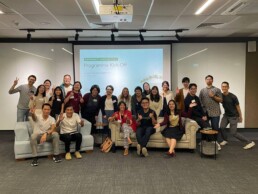
Good Design Research Initiative: Kick Off Session
What motivates a consumer to find value in sustainability, allowing them to make intentional choices based on environmental concerns or through social influence?
TRIA Pte. Ltd. in a joint collaboration with Studio Dojo and DesignSingapore Council, takes a deepdive into consumer insights on how #sustainability means to the consumer in multiple aspects of their lives.
A morning well spent through, as we kickstarted the first team meeting with volunteers of the program, coming from all fields including the medical healthcare sector, fashion retail to design research, in an engaging session with insightful sharings through our panel discussions. TRIA’s CEO Pei Kang Ng was able to share more about TRIA’s current projects. There were lively banters as the participants explored systems thinking on how business can benefit from understanding these customer insights.
#designthinking #systemsthinking, #sustainability and #circularity. cheaw hwei low Khai Seng Hong
Good #Design Research (GDR) Initiative is supported by DesignSingapore Council to support companies that are deeply motivated to pursue and develop #innovative and impactful work that tackles complex global, #societal and sustainability challenges.
CNA | F1 Singapore GP makes efforts to go green
In 2019, F1 launched a countdown to reaching net-zero carbon by 2030 and hosting #sustainable races by 2025.
Single-use plates and cups available at the event will also be different from the typical ones that are known to leave a larger carbon footprint. Instead, the disposable tableware – made with #plantbased material and provided by local startup TRIA Pte. Ltd. – will be collected after use and converted into #fertiliser.
“It is digestible, it can be broken down. So we further put it through our digestion technology, we can #accelerate the pace rapidly, to the extent (it) can be turned into fertiliser,” said TRIA’s chief executive Pei Kang Ng Pei Kang.
Fertiliser producer Yara International is exploring ways to make TRIA Pte. Ltd. ’s fertiliser suitable for use in farming. Given that the firm’s organic fertiliser is low in nutrient density, it needs to be mixed with chemical fertiliser to give it value in the agricultural industry.
Mr Werner Prinsloo, director of Sustainability & Food Chain in Africa & Asia at Yara International, explained why his firm is eyeing TRIA’s fertiliser. “There is no need to separate anything. And that allows us to have a more consistent organic mineral fertiliser in the end. So it’s just really the ease of use and the fact that they are truly a #circular #packaging company,” he said.
Source: Channel News Asia TV and Online
Credits: Aslam Shah
CNA | Fast food chain KFC works with TRIA
Channel News Asia | Fast food chain KFC works with TRIA
Fast food chain KFC is making its operations more sustainable by working with packaging company TRIA. Bio-based material is incorporated into these single used packaging which are then collected along with food waste.
These are then converted into fertiliser. The plan is to make it into commercial grade fertiliser. It can be used in agriculture to ensure food sustainability. How can we salvage that and feed that back into our food eco-system. This is something we (TRIA) are ensuring to make sure the loop can be closed. CEO, TRIA – Ng Pei Kang
Sources: https://www.channelnewsasia.com/watch/singapores-fb-industry-works-tackle-climate-change-video-2787561
Tatler | Sustainable packaging
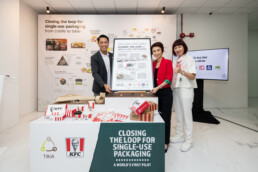
Tatler Singapore | Sustainable packaging firm TRIA works with KFC SG
The Singapore-based company and the fast-food chain embark on a six-month pilot programme to turn waste into nutrition for agriculture using TRIA’s patented technology. Sustainable packaging company TRIA has partnered KFC Singapore on a six-month pilot programme to convert the fast-food chain’s food waste and single-use packaging into farm fertiliser. KFC will test out TRIA’s solution at its outlet at Northpoint City mall in Yishun, swapping out its regular packaging with TRIA’s proprietary Neutria foodware, which is compostable and made using plant-based materials such as corn. The outlet’s packaging and food waste will be collected and delivered to a recycling plant. There, the waste will be thrown into TRIA’s patented Bio24 digester, which breaks it down into smaller pieces and enables natural enzyme action in order to produce compost within 24 hours.
https://www.tatlerasia.com/power-purpose/gen-t/sustainable-packaging-firm-tria-to-turn-kfc-packaging-and-food-waste-into-farm-fertiliser
BT | Circular economy solutions: Minister Low Yen Ling

The Business Times | Circular economy solutions: Minister Low Yen Ling
There’s potential for F&B brands to innovate and become front-runners in sustainability, says Minister of State for Trade and Industry, Ms Low Yen Ling. TRIA Pte. Ltd. is a “closed-the-loop” company for packing solutions – working clients from concept, development to manufacturing as well as in #lifecycle #carbon assessments, to develop an end-to-end ecosystem that helps them meet their #sustainability goals. Singapore Enterprise TRIA partners with fast food giant, KFC to launch a pilot program that is a first of its kind. This program brought together strategic partners such as catalist-listed #environmental services providers Ansari – Shanaya Group, urban farming pioneer ComCrop, Agribusiness consulting firm The The Boralis Group Group, and Norwegian chemical company Yara International are other partners involved in the pilot.
This pilot is supported by Enterprise Singapore.
“TRIA Pte. Ltd. has been strengthening its #innovation capabilities over the years, and this collaboration with KFC will validate a food waste #circular model, which will be in line with the global push for sustainability efforts. Enterprise Singapore will also continue to support companies with promising solutions like TRIA to expand into international markets,” said Soh Leng Wan, assistant CEO (manufacturing and engineering) of EnterpriseSG.
Click here to read the full article.
TODAY | 'Clever solution': S'pore firm launches pilot
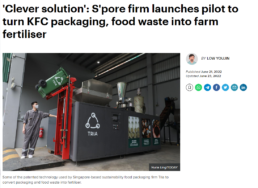
- Packaging firm Tria and fast-food chain KFC have begun a six-month-long pilot programme
- The collaboration between the two companies will see it turning both single-use food packaging and food waste into fertilisers for farmers
- This will be done through a technology patented by Tria
SINGAPORE — Singapore-based sustainable food packaging firm Tria has begun a six-month-long pilot with fast-food chain KFC Singapore to turn single-use packaging and food waste into agricultural fertiliser. It is an endeavour that they are claiming is a world first.
Mr Ng Pei Kang, chief executive officer of Tria, said during an event launch for the pilot on Tuesday (June 21) that the biggest challenge when it comes to recycling food packaging is segregating the food waste from the containers.
The cost of segregating the two, he said, can be up to five times the cost of the packaging itself, so it does not make business sense for food-and-beverage firms to make an attempt at recycling.
“What we are trying to do is solve the problem of segregation… by avoiding segregation,” he said.
As part of the pilot, KFC will be using its outlet at Northpoint City mall in Yishun to testbed Tria’s solution. The outlet serves food in Tria’s proprietary Neutria foodware — which is essentially compostable packaging made from plant-based material such as corn or sugarcane fibres.
Mr Ng told TODAY that customers will not be paying more as a result of this programme.
HOW IT WORKS
The packaging and food waste from the KFC outlet is collected and sent to a recycling plant where it is dumped together into a machine, a type of composter patented by Tria, that breaks the waste down into smaller components before microbes digest it.
This turns the waste into fertiliser, in a process that takes about a day.
Mr Ng added that the machine is able to sift out anything that is inorganic, such as metal or plastic that gets into the food and packaging waste.
One tonne of waste is able to yield about 200kg to 300kg of fertiliser.
Mr Ng eventually hopes to sell the fertiliser to farmers in Singapore and Malaysian once the company is able to put out a consistent supply.
For now, the success of the pilot hinges on three factors.
KFC told TODAY, however, that the firm will gather feedback on the packaging from both the outlet’s team as well as patrons.
The second factor involves the waste collection process. In general, mall operators are responsible for dealing with the waste collection for their tenants.
For the pilot, KFC’s general manager Lynette Lee said during the launch that the firm has been able to come to an arrangement with Northpoint City’s operator, Frasers Property, to facilitate the collection of the outlet’s food waste and have it sent to Tria.
Mr Ng said that the team will be exploring to see how this “waste-owner model” can be extended, and whether it means Tria will eventually be able to represent KFC at all malls in terms of waste collection.
The final factor relates to whether the fertiliser that the firm produces contains the right nutrients that farmers need to suit different farming seasons.
Mr Ng said that Tria is working on this with one of its partners, Yara, a Norwegian fertiliser company.
Being able to create a fertiliser that is of a commercial grade suitable for growing food on a mass scale will be the “chapter that will unlock new growth potential” for Tria, Mr Ng added.
When asked if operational costs will also be looked at, he responded by saying that the pilot is more of a “qualitative assessment in terms of functionality”.
“It’s a bit too early to be considering operational costs because there is no economy of scale (right now).”
“With the success of our partnership, we hope to take the lead and bring together a zero-waste closed loop recycling concept to the food and beverage industry. We believe this will contribute positively to the Singapore Green Plan.
KFC Singapore”
Once the pilot is over, KFC said that it will work with Tria to assess the scalability of the initiative across all 80 of its branches in Singapore as part of the chain’s “continued efforts towards environmental sustainability”.
“With the success of our partnership, we hope to take the lead and bring together a zero-waste closed loop recycling concept to the food-and-beverage industry. We believe this will contribute positively to the Singapore Green Plan.”
Aside from bringing on board other food-and-beverage operators, Mr Ng also hopes to introduce Tria’s closed-loop solution to caterers and even event organisers.
There are, however, no plans to focus the business for residential use yet. This is because it involves the national waste infrastructure, which is “more complex” because a system needs to be in place to cater for the whole of Singapore, Mr Ng said.
Ms Low Yen Lin, Minister of State for Trade and Industry, said during a speech at the event that “clever circular economy solutions” such as the collaboration between Tria and KFC have the potential to break the cycle of escalating waste.
“Growing consumption in Singapore has led to greater amounts of packaging and food waste,” she added. Yet, recycling rates remain low.
The National Environment Agency has said that Singapore’s overall recycling rate was 55 per cent last year, marginally higher than 52 per cent in 2020 — the lowest in the decade.
Singapore has repeatedly sounded the alarm on the need to improve the nation’s recycling rate since its only landfill on Pulau Semakau is expected to run out of space by 2035.
On the collaboration, Ms Low said that it not only reduces pollution by lowering the amount of waste being burnt or sent to landfill, but also “contributes to a greener environment and brings (Singapore) closer to our Zero Waste goals”.
Read full article here: https://www.todayonline.com/singapore/spore-firm-kfc-pilot-turn-packaging-food-waste-fertiliser-1929816
Mothership | KFC to use plant-based packaging
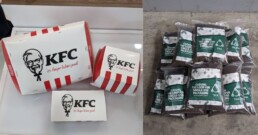
If you’ve dined at Northpoint City’s KFC outlet in June 2022, you might not have noticed anything different about the experience. But not only does the outlet have a new type of plant-based food packaging, none of the food or packaging waste will head to the incinerator.
Closing the loop
For the next six months, the waste produced by KFC patrons at Northpoint City will go towards feeding a special waste digester in Tuas instead. This is part of the world’s first pilot for closed-loop organic recycling of single-use packaging and waste. The digester takes in both food waste and packaging and transforms it into farm-ready fertiliser in just 24 hours. This entire end-to-end system is practically zero waste. To consumers though, the entire range of food packaging feels and looks exactly the same.
From plant to packaging to fertiliser
The proprietary system was developed by innovative foodware company and local start-up TRIA. They launched the pilot programme with KFC Singapore on June 1, a collaboration that was facilitated by Enterprise Singapore.
“Globally, no fast food brand has managed to close the loop for dine-in single-use packaging,” said a joint press release by KFC and TRIA. The plant-based packaging is a mixture of paper and bioplastics, which is made from sugar-based plant crops like industrial corn and leftover sugarcane pulp sourced from the U.S., Thailand and Taiwan. The fertiliser made by the digester will go towards local agriculture to support Singapore’s 30 by 30 food security goal or otherwise exported to Malaysia. TRIA CEO Ng Pei Kang told Mothership the research for the technology has been underway for about nine years, and just under S$1 million has been funnelled into its development.
Food waste and packaging recycled together
KFC general manager Lynette Lee said that the need to review how food packaging can be more environmentally sustainable was partially driven by the pandemic. “During the past two years of the Covid pandemic, we saw a shift towards food takeaway and delivery. Instead of less packaging, the food industry saw an increased usage of packaging, be it plastic or paper. Even when regulations are now relaxed, consumers have grown to love the convenience of these services.”
Food packaging is notorious for being hard to recycle, and one main challenge is segregating it from food waste. It is commercially unviable as recycling food packaging would cost five times more than the packaging itself, said Ng. TRIA’s patented technologies to break down the plant-based packaging allow both to be processed together without segregation. At any one time, the food digester can turn 1,000kg of food waste and packaging into 200 to 300kg of fertiliser. Ng shared that he sees potential for the closed-loop system to be used for catering events and on airlines. TRIA also has plans to scale up its closed-loop solution to KFC outlets locally and worldwide, as well as to other global foodservice brands. Source: https://mothership.sg/2022/06/kfc-plant-based-packaging/
